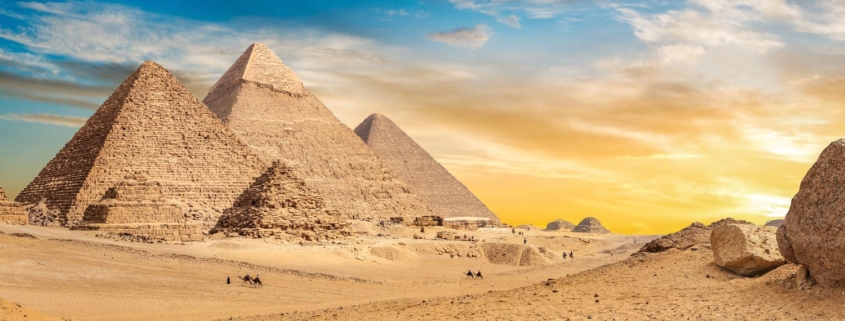God of Deliverance, Pt. 1
What Is the Good News of Yeshua? (Part 8)
Having dispersed Noah’s descendants to form a world of nations, God continued His reconciling work through obscure, unremarkable Abraham. God covenanted with Abraham that He would make him into a great nation, give him a great name, and make him a blessing to all the families of the earth. God also promised Abraham a land as a possession for the generations that would miraculously be born through him. And even though he had no children, and was personally given no inheritance in the land—“not even a footstep” (Acts 7:5, mjlt)—Abraham believed God. The covenant made by the God of Promise was renewed with Abraham’s son Isaac, and again with Isaac’s son Jacob…
…the promise, however, would not come without pain.
Even before Abraham had first become a father, God gave Abraham the bad news.
“[K]now that your seed will be a [sojourner] in a land not theirs… [and that nation] will have afflicted them for four hundred years. But [those] whom they serve I also will be judging, and after this [your seed] will go out with much property.” (Genesis 15:13-14, mjlt)
Abraham’s promised progeny would take a necessary detour from the blessings of the promised land to be afflicted in a foreign one—and this for almost half a millennium. Yet it would not be Abraham, nor Isaac, who would see God’s word come to pass. Rather it would start with Jacob—whom God named Israel—and his twelve sons. The people of Israel would go into bondage, but the God of Israel—the God of Deliverance—would bring them out.
Jacob had returned to the land of his father Isaac, where his sons would work the pastures as shepherds. But of all his children, he most loved his eleventh son, Joseph (Genesis 37:3)—a fact not hidden from Joseph’s many older brothers. They were therefore jealous of Joseph (37:11) and they hated him (37:4), so they betrayed him and sold him into the land of Egypt (Acts 7:9). Yet it was not the brothers’ betrayal that sent Joseph there, but the God of Deliverance, who sent him to preserve a remnant and “give life… by a great escape” (Genesis 45:5ff). A great famine arose, but Joseph had found favor in Egypt, so he called Jacob and his sons to the land of deliverance—though not the one promised to his fathers. Reassured by God that He would bring them back again (Genesis 46:3-4a), covenant-carrying Jacob went down to Egypt—along with the seventy souls of his house—and joined his son and deliverer Joseph, trusting the covenantal faithfulness of the God of Israel.
Israel settled in Egypt in the land of Goshen, and they were fruitful and increased greatly in number there—just as God had said they would do. Jacob, Joseph and all his brothers eventually died (Exodus 1:6), and soon another king arose over Egypt. This new king, however, had not known Joseph (Acts 7:18), and was therefore uneasy about the rapid expansion of this peculiar people on his sovereign soil (Exodus 1:9). So this Pharaoh enslaved the people of Israel, working them severely with bitter, hard labor (1:11ff). And for more than three centuries, the people of Israel endured their cruel and harsh enslavement…
…when the time had finally arrived for God to raise up another deliverer.
The king at the time continued to be gravely dissatisfied with the Hebrews’ multiplication, despite their imposed, oppressive conditions. So in a genocidal act of heartless population control, he ordered his Egyptian subjects to drown all of Israel’s newborn sons in the Nile river (Exodus 1:22). One resistant Hebrew family was unwilling to allow the slaughter of their beautiful infant son, so his mother set him in a basket on the river, that it might sail him to a better destiny (2:3). As his older sister followed along the shore, the basket landed in the reeds near the daughter of Pharaoh. She recognized the child as one belonging to the Hebrews, and sent him back—unknowingly—to his own mother for nursing (2:6ff). When the child was weaned, he was returned to the daughter of Pharaoh, who named him Moses, and raised him in the wisdom and power of Egypt (2:10).
For forty years (Acts 7:23), Moses lived as an Egyptian in the palace of the king, yet he was not unaware of his camouflaged Hebrew origins. Perhaps agitated and torn from decades of seeing his people’s cruel treatment, it was only a matter of time before he could bear it no longer, and upon encountering an Egyptian beating one of his own Hebrew brothers, he would finally snap (Exodus 2:11-12). Moses killed that Egyptian, and then—though he was not afraid (Hebrews 11:27)—he fled under the death-threat of Pharaoh (Exodus 2:15), soon finding himself in the land east of Egypt. There he would marry, have children, and live quietly—for a lifetime (2:21ff).
Did this post bless you?
♥
But the God of Deliverance was hardly done with Moses.
By faith, [Moses] counted the disgrace of the Messiah greater wealth than the treasures of [Egypt]; for he looked to the payment of the reward. By faith he left [Egypt] behind, not having been afraid of the rage of the king. For, as seeing the Invisible One—he endured. (Hebrews 11:24-27, mjlt)







Leave a Reply
Want to join the discussion?Feel free to contribute!